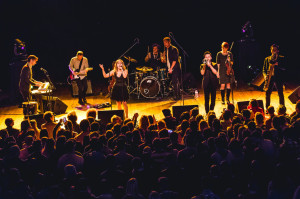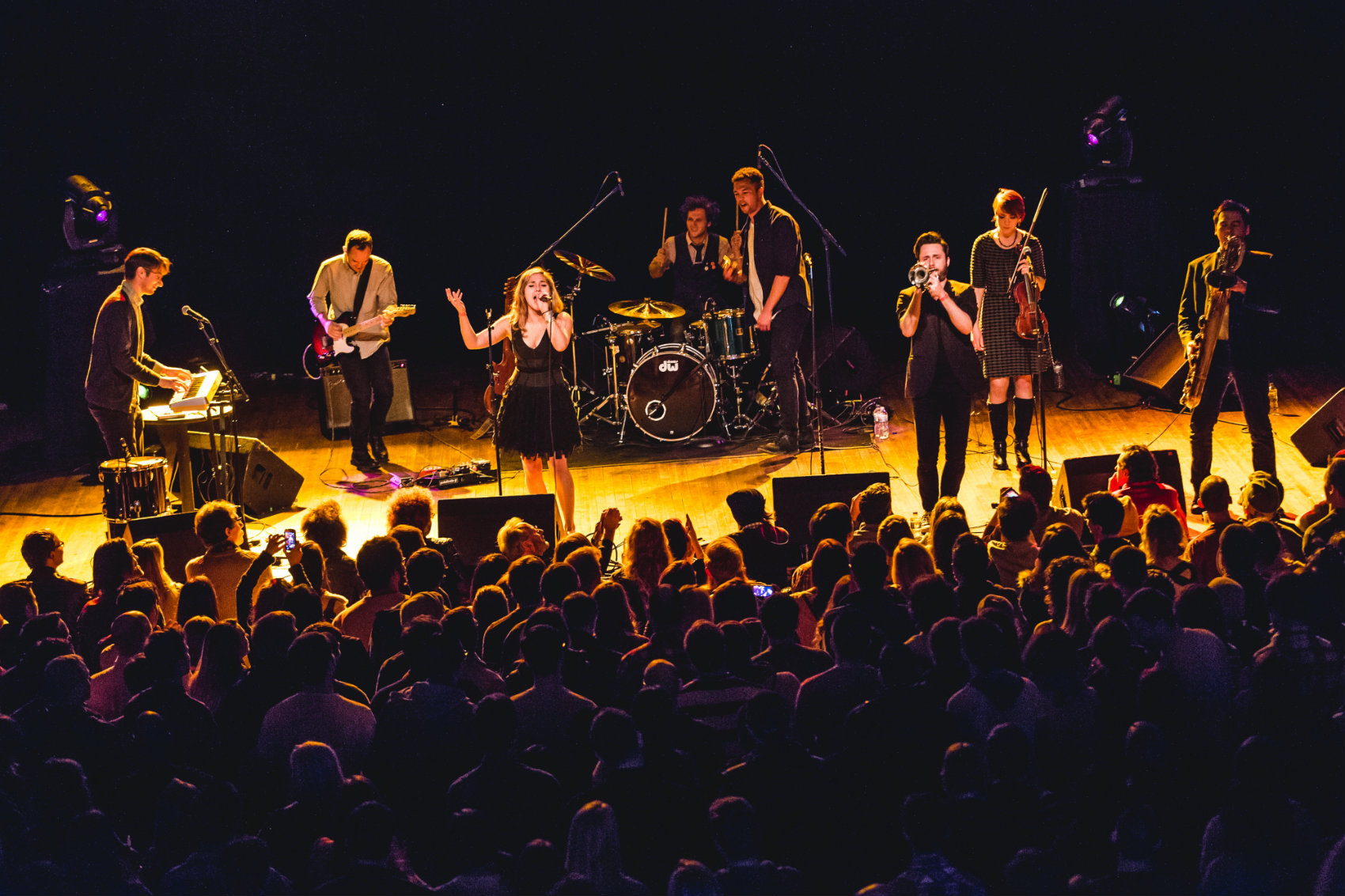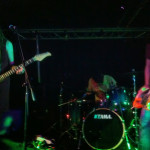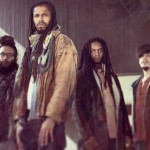
Brooklyn-based San Fermin are much much more than just another buzz band but more a ever evolving sprawling collective of players and vocalists who are on a quest to breath the pain and pleasure of life into song. At the eye of a storm of over twenty musicians is 24-year-old composer and songwriter Ellis Ludwig-Leone, San Fermin released their self-titled debut album in November 2013 via Downtown Records, it was one of the sleeper hit debuts of 2013. A esquisite orchestral pop album, that’s songs were crafted around the narrative arc of ‘a dialogue between an earnest, unhappy man, and a cynical, elusive woman.’ According to Pitchfork, the album uses “specific chord progressions associated with the male character’s ‘earnest angst’ and ‘the girl’s forced nonchalance’.”
Written in just six weeks in the Canadian Rocky Mountains it’s an impressive longplayer encompassing wonderfully weighty enveloping character studies such as ‘Renaissance’ and new single ‘Methuselah’’ an evocative ballad about losing touch with things you thought you loved and creating fictions to replace them. Its tremulous widescreen instrumentation is anchored by wounded masculine baritone that bring to mind the folkish sounds of Beruit or evocative washes of The National. Alongside the rippling brass pop of the startling ‘Sonsick’ replete happy/sad female vocal interplay that gives euphoric voice to a wrestle with anxiety, bringing to mind both the spiraling melodies and grandeur of Love and playfulness of The Go! Team..
San Fermin are currently in the middle of a run of European dates the band having coalesced into a core of eight members including Ludwig-Leone: Rae Cassidy and Allen Tate on lead vocals;Charlene Kaye vocals/violin; John Brandon, trumpet; Stephen Chen, saxophone; Tyler McDiarmid, guitar; and Michael Hanf, drums. We caught up wth Ludwig-Leone for a peek behind the curtain of one of this past year’s most appealing new acts:
If you had to pinpoint five records that you first fell in love with what would they be?
The Beatles Abbey Road
Paul Simon Graceland
Ben Folds Five Whatever and Ever Amen
Beck Odelay
Sufjan Stevens Come On Feel The Illinoise!
I have read that in the past you have assisted in arranging for The National, Passion Pit, Erykah Badu, Sonic Youth’s Lee Ranaldo, and more. Did this work give you an insight into how records/songs are shaped and how you would like to approach songwriting?
A lot of the work I did as a musical assistant was for the composer Nico Muhly, who I worked for after I graduated from school, during the time period when I wrote the record. He works on so many different projects, arranging for bands, writing operas, incidental music for plays… pretty much everything a composer can do, he does it. So I would say that I learned a lot from that; how to adapt yourself to any different musical situation. Arranging songs was certainly part of that education, though the songwriting part was a little less so.
Do you listen to music whilst recording or do you find that starving yourself of other people’s work gives you space to write?
On the first record, I listened to a lot of other music as a sort of reference point. I think it makes sense to stay current, so that your work can engage with what’s happening today. But on the second record, which I’m recording now, I’ve listened to a lot less contemporary music. It helps to have a first record to reference… You start to get a sense of what sticks, what feels like your voice.
I have read you spent time in Canadian Rocky Mountains at the Banff Centre, writing songs did that kind of environment aid the creative process?
It definitely helps to be alone. I’ve found that your feelings kind of expand to fill the empty space. And it doesn’t hurt to be in such a grandiose setting.
Where does the name come from?
The name comes from the festival that happens every year in Pamplona, Spain. It’s weird how people put themselves in this dangerous position every year for nothing but the thrill of being alive.
How do the songs first start out, what do you write them on?
I write them on a mixture of loose leaf staff paper, Logic, and Sibelius. They’ll start with a musical idea, maybe a harmonic progression or a melody line, and then they build out from there. I write the arrangements and lyrics all at once, so there’s never a “bare bones” version with like, me on a guitar or whatever.
I read that you structured the entire album as a dialogue between an earnest, unhappy man, and a cynical, elusive woman… did this happen after the songs were written or somewhere in the middle of the production process?
That interaction was kind of the framework for the record. It helped to generate the momentum from song to song, to frame each song as a response to the one before it.
The finished songs have a grandeur was this intentional or how they emerged over the time layering them in the studio…?
It wasn’t intentional so much as just the way I write. I tend to overdo it… a lot of those songs actually had even more going on that I had to strip out. You should hear the first version of Renaissance!, it’s totally insane.
I have read critics compare your works to the likes of The National, Beirut and Go Team…how do you find comparisons it must be difficult as each San Fermin song sounds like a different animal?
I welcome them… especially on a first record, it helps people to contextualize us, and for the most part they’re warranted. The thing I want them to take away from the record, though, is that every song is different as you say. It’s stylistically kind of all over the place, and I think that’s what makes it interesting.
Renaissance and Methuselah at least on the surface seem to be written in the first person, is that how they started out life?
Nothing on this record is based on events in my actual life, if that’s what you mean. I’ve been pretty militant about keeping my characters separate from my personal life. As a songwriter obviously there’s a reason you want to write this stuff, because it correlates to things you’re thinking about, but I think it’s more like how an author writes for his characters, rather than a confessional singer-songwriter-y thing.
Vocal almost harmonic interplay seems to fire off songs such as Sonsick and Crueler Kind does that kind of use of vocal notes to build the framework of a song interest you?
Definitely. On this second record especially, I’ve substituted vocal lines in places where you might expect a more traditional kind of harmonic instrument, like a guitar or a piano, to be playing chords.
At the time of writing Sonsick is nearing on the 1 million streams mark, are you proud that it has reached people across the world? The use of brass on that song seems quite integral to the vocal interplay, what is the song about and how did it get to the finished version we hear on record?
It’s really exciting that people are responding so well to the song! It was really almost an afterthought; it was the last song I wrote, almost two months after I had written the rest of the record. I was feeling a lot of anxiety about being back home and seeing the decisions people around me were making about their lives. The song really was about the panic that comes with making those decisions, and then I added a bunch of brass in there kind of instinctively to liven it up. It’s a celebration of the anxiety I guess.
You are performing a lot this Summer, at various festivals and headlining your own shows, what can fans expect from a San Fermin live show or is it different depending upon the cast of players, the venue and the night?
It’s a lot more upbeat– there’s more energy in the live show for sure. We generally don’t play the interludes and the individual band members have all kind of tailored their parts so there’s more room for improvisation. It’s still a pretty nuanced, complicated thing, but it’s just a bit looser than the record.
Are there plans for a second album?
Yes! I’ve been writing it in between touring. The idea is to record it this summer and put it out hopefully sometime in the winter or spring of 2015. I’m really excited about it– the first record is still just catching on but I wrote it over two years ago! So it feels like it’s time to move on to something new.
San Fermin Live dates:
Monday 28 April Munich, Germany – Strom
Tuesday 29 April Zurich, Switzerland – Ziegel Oh Lac at Rote Fabrik
Saturday 3 May Leeds UK – Live at Leeds
Sunday 4 May Manchester, UK – Deaf Institute
Tuesday 6 May Newcastle, UK – Think Tank
Wednesday 7 May London, UK – Village Underground
Thursday 8 May Cambridge, UK – Portland Arms
Friday 9 May Amsterdam, NL – London Calling
Friday 18 July Southwold, UK – Latitude Festival




